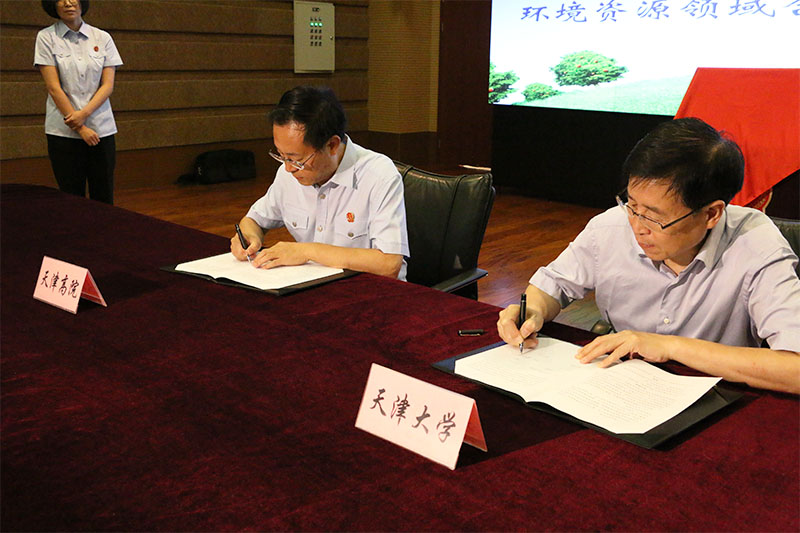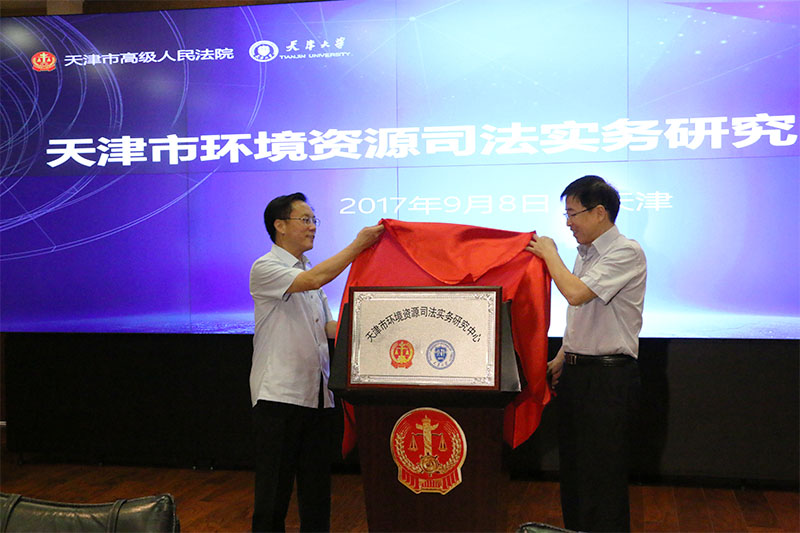A Cooperation Framework Agreement on Environmental Resources Signed between Tianjin University and Tianjin Higher People’s Court
On September 8, 2017, Tianjin University (TJU) and the Tianjin Higher People’s Court (the “Court”) have entered into a Cooperation Framework Agreement on Environmental Resources (the “Agreement”) at the Tianjin Higher People’s Court.
The Agreement allows for cooperation between the two institutions in various areas including trial practice, theory research and personnel exchange. With respect to the area of trial practice, both institutions will focus on the establishment of think tank of experts in the field of environmental resources law, the election of professional assessors and the cooperation in judicial expertise; in the area of theory research both institutions will contribute the academic and empirical research as well as participation in major research projects and the last refers to cooperation in academic study, trial participation and information sharing.
Li Jiajun, Party Secretary of TJU, and Gao Jinghong, Party Secretary and President of Tianjin Higher People’s Court, signed the cooperation agreement and announced the co-establishment of the Tianjin Judicial Affairs Research Center on Environmental Resources.

Li Jiajun, Party Secretary of Tianjin University (on the right), and Gao Jinghong, Party Secretary and President of Tianjin Higher People’s Court (on the left), signed the cooperation agreement

Li Jiajun, Party Secretary of Tianjin University (on the right), and Gao Jinghong, Party Secretary and President of Tianjin Higher People’s Court (on the left), unveiled the Tianjin Judicial Affairs Research Center on Environmental Resources.
At the signing ceremony, representatives from TJU and the Court exchanged their opinions on the best ways to achieve effective cooperation.
Qian Hailing, Member of Party Leadership Group and Vice President of Tianjin Higher People’s Court, gave a brief introduction on the trial of environmental resources cases in Tianjin. Qian explained that Tianjin Higher People’s Court, based on the new judicial requirements of environmental resources, implemented environmental resources law, updated environmental resources judicial idea, and made uniform judicial practice. Through hearing cases of environmental resources according to law, it has ensured that the rights and interests of people are guaranteed.
Sun Youhai, Dean of the Law School and Executive Director of the Research Institute of China Green Development at TJU, described the development of TJU’s discipline of environmental law, the Institute and the Environmental Damage Judicial Authentication Research Base of the Supreme People’s Court (SPC) at Tianjin University. Sun pointed out that TJU, with its academic talent and the Higher People's Court boasting a large data-base and valuable judicial practice, should facilitate comprehensive cooperation to build the Tianjin Judicial Affairs Research Center on Environmental Resources into a first class institution.
Jing Hong, Director of the Civil Division I of the Tianjin Supreme People's Court on behalf of the judges, put forward several key steps to make the framework agreement into effect.
Zhang Jianwei, Associate Dean of the Research Institute of China Green Development at TJU and Professor of TJU Law School, stated that research on environment law must be based on practice so as to address problems and facilitate feasible solutions.
Li Jiajun, Party Secretary of TJU, expressed his support of the Agreement in that it conforms to the construction of an ecologically sound society, which is an important strategic deployment in the new historical era by the CPC Central Committee and an important step in achieving the Chinese Dream. And Tianjin University has always been committed to the development of disciplines, research, talent training, and social services, as well as contributions to eco-civilization construction and green development.
Gao Jinghong, Party Secretary and President of Tianjin Higher People’s Court, expected a win-win development through all-round and efficacious cooperation based on a substantial and well-constructed mechanism.
Editors: Yin Shiyu and Ross Colquhoun

